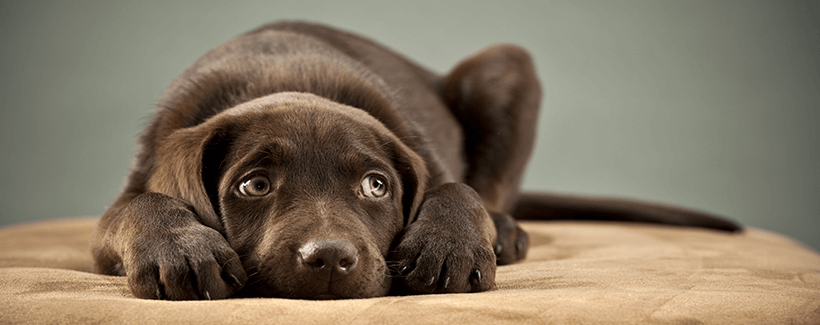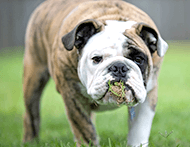Serving you since 1994
Serving you since 1994


"Generally a dog's desire to eat feces is not usually caused by any serious dietary or health issues."
NaturVet® Coprophagia Stool Eating Deterrent
A soft chew that deters stool eating and freshens breath.
We love our furry, canine companions for their loyalty, devotion and unconditional love. However, no pet owner loves a "poop-eating dog". For those unfortunate humans, being greeted and licked by the offending animal offers no reward, especially when you know exactly where that tongue has been. Most dog parents can take comfort in that they are not alone in battling this problem. Though pet owners find it disgusting, feces-eating in dogs emerges as an extremely common behavior, but also presents many challenges in stopping the habit.
Poop-eating is called by its own medical term, Coprophagy(pronounced cop-row-fage-ee-uh). It comes from the Greek terms copro for feces and phagy for eating. Dogs are not alone in this habit as a wide variety of animals from many species eat their own feces or others for several reasons. Among them are pigs, rabbits, hamsters, elephants, pandas, koalas and hippos. For elephants, pandas, koalas and hippos, their young are born with sterile intestines and must eat their mother's feces to add the needed bacteria to start their own digestive systems. Gorillas and chimpanzees also eat fecal matter as well as reports in human patients with schizophrenia, depression and pica (eating non-food items).
Coprophagy is also an expected duty of female dogs and cats as they stimulate urination and defecation in their litters by licking the appropriate areas. They eat and drink the urine and feces to keep the nesting area clean and distract predators away from any scent.
Related Article: Coprophagia in Dogs
Generally, a dog's desire to eat feces is not usually caused by any serious dietary or health issues. In fact, many veterinarians and researchers speculate it may just come from, well, being a dog. Many experts believe coprophagy can be traced back to a canine's ancestral past, descending from wolves and coyotes, and its scavenger roots, if food is in short supply. Typically normal behavior in domestic dogs, it likely evolved from scavenging and nest-cleaning behaviors from canines thousands of years ago since they most likely lived near human settlements to take advantage of the food sources available there, including human waste. Some researchers suggest part of the attraction by wolves and dogs to poop-eating stems from replenishing B vitamins, which they find in the feces of plant-eating animals.
Though poop-eating emerges as a common behavior for many domestic dogs, certain situations can create more compulsion to engage in coprophagy.
The latter possibilities are rare, so pet owners should understand poop-eating is seldom the mark of a significant, health issue.
On the human front, a poop-eating dog does present a threat to a human household since dogs can harbor bacteria like Salmonella, E. coli and infectious parasites in their stomachs without signs of illness. It is possible these threats can be passed on to family members via a dog's tongue when it licks its humans.
If a poop-eating dog worries its owner, it is best to get it checked out by your veterinarian. Typically, a vet will discover no abnormal findings in a physical exam, but it will give a chance for the dog owner to discuss the animal's behavior. Feces-eating may be infrequent or constant with a long-standing history since puppyhood or a more recent development. Dogs may eat their own feces, other dogs', or other species' poop, especially cat poop. Poop-eating can even increase in the winter when feces are frozen and they become more obvious in a cold, snowy environment. Of course, owners should be sure to share any other symptoms like weight loss, ravenous appetite, diarrhea, intestinal rumbling and flatulence with their vet. Acute onset in an older dog may indicate an abnormality in endocrine function or a cognitive dysfunction.
Generally, regular wellness screenings will help a vet determine if a real problem exists. If she suspects feces-eating is being caused by an abnormality, the veterinarian may call for basic lab diagnostics; a CBC, serum chemistry, urinalysis and fecal analysis for parasites, and perhaps, a thyroid profile. Since a dog can pick up parasites and worms from eating poop, a stool analysis twice a year is a good idea.
Common and normal behavior in many dogs, coprophagia does not arouse suspicion of a dietary, physical or behavioral abnormality in most cases. Its onset may be associated with a change in diet or environment, but the behavior will often persist even after the situation goes back to normal.
Whether it stems from some ancestral trait or new adventures in dining, breaking a canine from eating poop presents a tough road. Quite simply, dogs like this behavior and it offers immediate rewards. Behavior modification is difficult and may not be successful for the long term. A wealth of ideas and plans exist to nip poop-eating in the bud, but many are hard for most people to follow for a lengthy period.
The Clinical Veterinary Advisor cites seven effective methods for curbing coprophagia.
Other methods to stop coprophagia include improving a dog's diet with digestive enzyme and probiotic/prebiotic supplements. Probiotic product choice recommendations would be Puppy Booster, Probiocin® Oral Pet Gel, NaturVet® Digestive Enzymes powder, and Proviable®-DC. A prebiotic recommendation is Synacore® Digestive Support for dogs.
Another recommendation is to engage a dog's brain and ease boredom through exercise and play. A busy pet is less likely to seek out yard snacks. The Nina Ottoson line of dog toys are designed to stimulate dogs and decrease boredom. Several choices would be DogFinder, DogSpinny, DogTwister, and DogTornado.
An additional product designed to deter dogs from eating their poop is NaturVet® Coprophagia Stool Eating Deterrent, Plus Breath Aid.
Treatment for dog with coprophagia is guarded for complete cessation of this behavior. However, it is possible to reduce the frequency of the poop eating through behavior modification and environmental management and potentially eliminate it with the right approach. Starting young, along with offering a dog of any age plenty of the right stuff helps limit an animal's desire to eat feces. Dog owners can reduce access to poop and prevent the initial ingestion of feces as part of its exploratory behavior. Providing dogs with adequate diet, exercise, and socialization should help reduce the likelihood of coprophagia because of boredom, acting out or neglect.
Sometimes coprophagia and pica may be found in dogs with polyphagia (overeating disorders). Extended therapeutic success depends on properly identifying the primary disorder and following a consistent course of treatment for the animal.
Adding additives to a dog's food or products applied to the feces is often suggested as a treatment for poop-eating, but the Clinical Veterinary Advisor does not believe this method is consistently effective. Adding additives to a dog's food to make the stools have an unpleasant taste must be done unfailingly and failure to do so stops nothing. Likewise, a dog owner would have to apply feces-avoidance product to every stool in a yard for effectiveness or spray every feces in a dog's path during a walk or run.
A big part in creating a course for successfully stopping coprophagia involves educating dog owners. They must be assured coprophagia is normal. Though not the most enjoyable behavior for a canine, it is generally not life-threatening to the dog. Providing strategies for dog owners to solve the problem reduces the likelihood of it negatively affecting the way they interact with their dog and going to the extreme of removing the animal from the home.
Negative training approaches also can backfire. Rubbing a dog's nose in a stool as a method to break the eating habit fails on many levels since it may give the animal the idea it is supposed to snatch it up. A dog may devour it right away to hide the evidence and avoid punishment.
At times, although disgusting and revolting for a dog owner, poop-eating for a canine simply taps into its doggie instincts. With this knowledge and some advance planning and effort, dog parents can get a better handle on the behavior and in many situations, flush coprophagia goodbye!
{"one"=>"Select 2 or 3 items to compare", "other"=>"{{ count }} of 3 items selected"}